|
|
|
Sort Order |
|
|
|
Items / Page
|
|
|
|
|
|
|
| Srl | Item |
| 1 |
ID:
188804
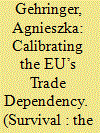

|
|
|
|
|
| Summary/Abstract |
As the energy crisis triggered by the Russian war against Ukraine vividly demonstrates, the EU suffers from inconvenient external dependencies. The trade dependence on China, the European Union’s main source of imports, could be an acute source of strategic vulnerability for the EU economy. Given the evident risks in maintaining close economic relations with authoritarian regimes, a policy change is needed to address the EU’s trade dependence, aimed not only at shifting economic incentives for businesses but also at reconciling sustainability goals with geopolitical priorities.
|
|
|
|
|
|
|
|
|
|
|
|
|
|
|
|
| 2 |
ID:
188801
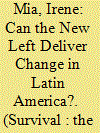

|
|
|
|
|
| Summary/Abstract |
The intense Latin American electoral cycle of 2020–22 coincided with deteriorating socio-economic conditions in the wake of the COVID-19 pandemic and increasing frustration with the status quo. Anti-incumbent sentiment coupled with demands for more inclusive and fair economic models prompted a pronounced shift to the left in the region, although with many different shades of ‘pink’. But an increasingly polarised and fragmented political and social environment is testing the ability of new governments to deliver change, as shown by the popular rejection of a new constitution in Chile. A more limited fiscal space is also constraining these governments’ effectiveness. Nevertheless, political alignment among countries with important stakes in global climate-change mitigation and thwarting drug trafficking could produce more cohesive foreign-policy stances and increased regional leverage.
|
|
|
|
|
|
|
|
|
|
|
|
|
|
|
|
| 3 |
ID:
188802
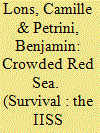

|
|
|
|
|
| Summary/Abstract |
It is unsurprising that the Red Sea region has come into sharper strategic focus for great powers as well as regional powers, given that 12% of global seaborne trade, 40% of Europe’s trade with Asia and the Middle East, and 8% of seaborne hydrocarbons pass through the Red Sea. Yet the region is chronically underdeveloped and conflict-ridden. Overlapping rivalries involving Iran, Israel and the Gulf Cooperation Council countries pose risks of intensifying regional discord. The United States has prioritised empowering its regional partners and strengthening emerging Israel–Gulf security synergies to counteract Iran’s activities and check China, which has become a key economic actor in the region and opened its first overseas military base, in Djibouti, in 2017. Given the potential divergence between American and regional concerns, however, neither US nor regional involvement appears likely to stabilise the region.
|
|
|
|
|
|
|
|
|
|
|
|
|
|
|
|
| 4 |
ID:
188803
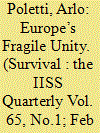

|
|
|
|
|
| Summary/Abstract |
The EU is unlikely to develop the kinds of efficient collective responses to the Russia–Ukraine war that it produced in reaction to the COVID-19 pandemic. The conditions of strategic interdependence generated by the Ukraine crisis are more demanding than those triggered by the pandemic because its consequences are asymmetrically distributed across member states. Germany will find it difficult to play the role of regional stabiliser, anti-Europe parties could become stronger, new intra-European cleavages may arise over collective goals, and the expansion of the crisis’s time horizon could weaken prospects for effective collective action.
|
|
|
|
|
|
|
|
|
|
|
|
|
|
|
|
| 5 |
ID:
188808
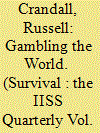

|
|
|
|
|
| Summary/Abstract |
From North Korea to Ukraine to Iran, the spectre of nuclear war continues to loom over global affairs. In his timely history Nuclear Folly, Harvard historian Serhii Plokhy takes a fresh and intentionally international look at one of the most fraught moments of the Cold War: the Cuban Missile Crisis. Contrary to the conventional view that US president John F. Kennedy brilliantly out-foxed his inept Soviet counterpart, Nikita Khrushchev, Plokhy posits that both sides repeatedly erred and misread each other – greatly increasing the likelihood of mutual annihilation. Plokhy draws lessons from the crisis for contemporary decision-makers, noting that the power to wield nuclear weapons still resides in a small number of hands.
|
|
|
|
|
|
|
|
|
|
|
|
|
|
|
|
| 6 |
ID:
188805
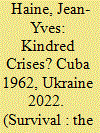

|
|
|
|
|
| Summary/Abstract |
There are numerous material differences between the Cuban Missile Crisis and the Ukraine conflict, and any comparison must be cautious. The international system is now multipolar, which makes the current conflict more complex and more global, but also potentially more tractable. The theory of nuclear deterrence has also become far more refined, and deterrence itself presumptively more stable. The Cuban Missile Crisis occurred in a very short time span, while the current conflict in Ukraine has been ongoing for one year and counting. One prominent similarity between the two crises is mutual miscalculation. In addition, both crises involve a risk-courting personalist dictator. Furthermore, Russian President Vladimir Putin’s willingness to flirt with nuclear brinkmanship, much like Nikita Khrushchev’s in 1962, raises the question of his rationality. The paramount lesson for the Ukraine crisis from the Cuban one may be the necessity of dialogue.
|
|
|
|
|
|
|
|
|
|
|
|
|
|
|
|
| 7 |
ID:
188807


|
|
|
|
|
| Summary/Abstract |
The juxtaposition of the political and cultural legacies of Henry Kissinger and Jean Monnet may help in interpreting the current phase of history. The evolution of the European Union has been consistent with Monnet’s vision of interdependence. The ‘return of the states’ connotes a new prominence for geopolitics and realpolitik in an increasingly multipolar world, squaring with the world order contemplated by Kissinger. This development has not yet obliterated global trade and value chains, but economic measures dictated by perceived national interests and geopolitical imperatives – including protectionism and sanctions – have impaired them. Such trends suggest a potential reprise of the situation preceding what Kissinger has called the ‘Second Thirty Years’ War’ – that is, the series of destructive conflicts between August 1914 and September 1945. Avoiding it calls for new statesmen of interdependence like Monnet.
|
|
|
|
|
|
|
|
|
|
|
|
|
|
|
|
| 8 |
ID:
188806
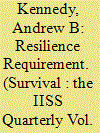

|
|
|
|
|
| Summary/Abstract |
The United States and its partners have arrived at a critical crossroads in their relations with China – and with one another – in the realm of high technology. Some degree of high-tech decoupling between the two sides is already under way, and recent events suggest this trend is accelerating. Combined efforts to bolster their collective resilience in the face of China’s rise remain inadequate. Going forward, much greater investment in resilience is required, including measures to absorb threatening Chinese actions and to adapt and transform in response to China’s growing technological prowess. While this will call for considerable acumen and effort on the part of like-minded governments, greater resilience would afford them renewed solidarity and enriched opportunities to sustain technological leadership in the future.
|
|
|
|
|
|
|
|
|
|
|
|
|
|
|
|
| 9 |
ID:
188800


|
|
|
|
|
| Summary/Abstract |
Three decades of efforts to secure North Korea’s denuclearisation failed to arrest Pyongyang’s development of a nuclear arsenal. With growing dangers of conflict escalation and nuclear use, it is time to consider alternative policies that address the reality of North Korea as a nuclear possessor state. Comprehensive arms control is worth exploring as one potential approach to managing nuclear dangers on the Korean Peninsula. Previously, conventional arms-control and denuclearisation negotiations with North Korea proceeded in parallel. However, the increasing complexity of deterrence resulting from changes in military capabilities, especially in South Korea, now necessitates a comprehensive process that creates linkages across conventional and strategic domains to address not just North Korean and South Korean, but also US, capabilities. Though comprehensive arms control promises to be politically fraught and technically complex, policymakers and experts should debate whether it could yield a more secure Korean Peninsula than existing policies that have long since failed.
|
|
|
|
|
|
|
|
|
|
|
|
|
|
|
|
| 10 |
ID:
188799
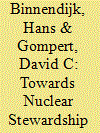

|
|
|
|
|
| Summary/Abstract |
With the rising risk of complex crises and military escalation in the Pacific region, the United States should invite China into a process of nuclear restraint and confidence-building, which we call ‘nuclear stewardship’. This process could start with a joint bilateral declaration that neither superpower would use nuclear weapons first against the other or its formal allies. This would acknowledge that neither side could gain by striking first with a nuclear device. This declaration could be the leading edge of a broader set of discussions on strategic stability and eventual implementation of confidence-building measures designed to enhance mutual understanding and trust in the US–Chinese nuclear relationship.
|
|
|
|
|
|
|
|
|
|
|
|
|
|
|
|
|
|
|
|
|